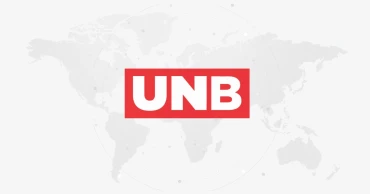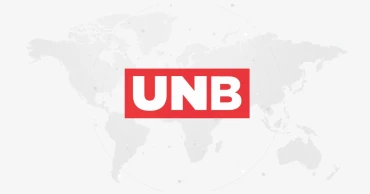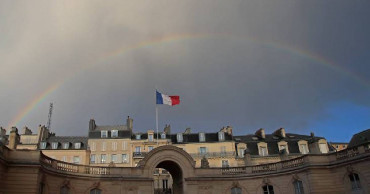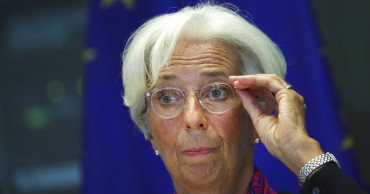European Central Bank
European inflation eases for 3rd month but prices still bite
Europe's inflation rate dipped at the start of the year, giving some relief to consumers but still leaving them facing higher prices that have driven protests and will likely press the European Central Bank into another interest rate hike Thursday.
The consumer price index for the 20 countries that use the euro currency reached 8.5% in January compared with a year earlier, European Union statistics agency Eurostat said Wednesday. That's down from the annual rate of 9.2% in December.
It's the first report on consumer prices that includes data from Croatia, which joined the eurozone on Jan. 1, but lacked unavailable figures from Germany, Europe's biggest economy. Inflation in Europe has now slowed for the third month in a row, falling from a record high of 10.6% in October.
Food and energy prices are persisting as the major factors driving up European inflation. Prices for food, alcohol and tobacco rose at a 14.1% annual pace in January, while energy prices rose 17.2%.
Russia's war in Ukraine has shaken up food and energy markets, and while commodity prices have fallen from all-time highs last year, consumers are not yet seeing relief on their utility and grocery bills.
Natural gas prices have dropped from records last summer thanks to a scramble to find supplies outside Russia and warmer winter weather that eased energy demand for heating. While Europe may have dodged fears of energy rationing and shortages after Russia cut off most supplies, natural gas prices are still three times higher than before Russia started massing troops on Ukraine’s border.
The energy upheaval has made the cost-of-living squeeze more painful in continental Europe and the United Kingdom than in the U.S., leading to protests and strikes from workers in several countries seeking pay that keeps pace with inflation.
U.S. annual inflation dropped to 6.5% in December, while the U.K. reading of 10.5% signaled how the British economy was a striking exception to the International Monetary Fund's brighter outlook for 2023.
Read more: Europe's inflation slows again but cost of living still high
In the eurozone, so-called core inflation, which doesn't include volatile food and energy costs, held steady at 5.2% last month, underlining how prices also are rising for both services and goods such as clothing, appliances, cars and computers.
Germany’s inflation number wasn’t available because of a technical issue so an estimate was used. Economists said that means the inflation figure should be taken with a pinch of salt.
Still, “when it comes to monetary policy, this is just noise,” Jack Allen-Reynolds of Capital Economics said in a report. “The core inflation rate is sending a clear signal: underlying price pressures remain strong.”
With inflation far above its target of 2%, the ECB has been raising interest rates that make it more expensive for consumers to borrow money. Aiming to get price spikes under control, the central bank is expected to institute another half-point hike Thursday.
That will come a day after a decision by the U.S. Federal Reserve and the same day the Bank of England acts on borrowing costs.
The central bank moves to cool inflation also strain the economy, with Europe eking out just 0.1% growth in the final three months of last year and 3.5% for all of 2022. That outpaced the 2.1% expansion in the U.S. and China’s 3% growth last year.
3 years ago
Europe’s inflation likely hasn’t peaked, says central bank chief Lagarde
The head of the European Central Bank said Monday she does not believe inflation has peaked after reaching the highest levels on record.
ECB President Christine Lagarde also told European lawmakers that the bank isn't through raising interest rates to combat those price spikes.
There is too much uncertainty to know whether inflation, which hit 10.6% in October, would come down soon in the 19 countries that use the euro currency, Lagarde said.
When looking at what is driving inflation, “whether it is food and commodities at large, or whether it is energy, we do not see the components or the direction that would lead me to believe that we have reached peak inflation and that it is going to decline in short order," she said.
That means the central bank will “continue to tame inflation with all the tools that we have," primarily interest rate hikes, Lagarde told the European Parliament's Committee on Economic and Monetary Affairs.
Read more: European leader calls on world, China to pressure Russia
Following the bank's third major rate hike in October, marking its fastest pace of increases ever, the ECB expects "to raise rates further to the levels needed to ensure that inflation returns to our 2% medium-term target in a timely manner," she said.
The ECB has joined the U.S. Federal Reserve and other central banks around the world in rapidly raising rates to combat inflation that spiked as the global economy recovered from the COVID-19 pandemic, then got worse after Russia invaded Ukraine. Central banks risk tipping economies into recession as the world copes with an energy crisis, higher food costs and currencies weakening against the U.S. dollar.
The Paris-based Organization for Economic Cooperation and Development predicted the international economy would expand only 2.2% next year. Most economists expect a recession in places like Europe, the U.S. and the United Kingdom next year, with ECB Vice President Luis de Guindos saying this month that risk “has become more likely" in the eurozone.
Russia's war hit Europe particularly hard, “given our proximity to the conflict and our dependence on energy imports" from Russia, Lagarde said Monday.
Read more: Record inflation puts the squeeze on Eurozone economies
After Russia cut back most natural gas to Europe, sending energy prices soaring, governments have provided aid to help households and businesses with their bills.
Lagarde warned officials not to worsen inflation by ensuring support is “targeted, tailored and temporary" to those most at need and avoids weakening the push to cut energy use.
3 years ago
European Central Bank faces pressure from record inflation
The head of the European Central Bank could drop more hints Thursday about when the bank will start raising interest rates, with pressure increasing to follow the United States, United Kingdom and other countries in taking a harder line to combat soaring consumer prices.
People in the 19 countries that use the euro currency have seen costs increase for everything from food to fuel as inflation rose to an annual rate of 7.5% last month, the highest since statistics began in 1997.
Driven by energy prices that have soared ever higher since Russia invaded Ukraine, record inflation has sharpened attention on when the European Central Bank will take more drastic steps to control excessive price increases for consumers. Bank policymakers meet Thursday.
President Christine Lagarde opened the door a crack for an interest rate increase later this year during a news conference following last month’s meeting, when the bank said it will speed up ending its pandemic stimulus efforts. That’s key to interest rate decisions because the bank has promised a rate hike will only follow the end of bond purchases.
The war in Ukraine has sent inflation surging to unexpectedly high levels. Prices for oil and gas have been rising on fears of a cutoff from Russia, which is the world’s largest oil exporter, and as the recovery from the COVID-19 pandemic increases demand for fuel.
As inflation grows worldwide, the U.S. Federal Reserve hiked its benchmark short-term rate last month and indicated it will continue raising it sharply this year. The Bank of England has raised raised its key interest rate three times since December.
Yet the European Central Bank is in a different situation. Economists say much of the U.S. inflation is homegrown — a side effect of massive federal stimulus and support spending during the pandemic. Europe’s inflation, on the other hand, is largely imported through higher oil prices, which are generally beyond the reach of interest rate policy that central banks control.
On top of that, higher inflation and supply bottlenecks are weighing on economic growth, leading to what some are calling “stagflation.” A combination of slow growth and high inflation, the phenomenon poses central banks with a dilemma: that the rate hikes needed to combat inflation could also hurt growth and jobs.
Stressing consumer purchasing power has helped French presidential candidate Marine Le Pen, a far-right nationalist, narrow the polling gap against centrist incumbent Emmanuel Macron in the campaign ahead of the runoff April 24.
Inflation in Europe is expected to fall next year. How much of the current inflation will wind up being built into the economy long term is an open question.
Analysts said the European Central Bank will probably leave rates unchanged Thursday and avoid giving a clear timetable for a hike.
Lagarde might stress continuing risks to the economy and shift her position slightly toward a possible increase sooner than later — without making a clear commitment, analysts say.
Key takeaways could be “an even stronger ECB emphasis on the risks to its outlook” and “a further hint that the ECB may raise rates later this year,” according to Holger Schmieding, chief economist at Berenberg bank.
Lagarde tweeted April 7 that she had tested positive for COVID-19 and was having mild symptoms. It remains to be seen if she will hold her news conference in person at the bank’s Frankfurt, Germany, headquarters or remotely.
The ECB’s benchmark rates are at record lows: zero for lending to banks and minus 0.5% on deposits from banks, a penalty rate aimed at pushing them to lend the money instead.
3 years ago
Draghi takes helm in Italy, focused on pandemic recovery aid
Mario Draghi, the man largely credited with saving the euro currency, took the helm as Italy’s premier Saturday after assembling a government of economic experts and other technocrats along with career politicians from across the spectrum to guide the pandemic-devastated nation toward recovery.
5 years ago
Eurozone economy records worst year since 2013
The eurozone economy, which is made up of the 19 countries that use the euro currency, ended 2019 with a whimper and recorded its worst year of growth since it was mired in a debt crisis in 2013.
6 years ago
New European Central Bank chief holds her first rate meeting
Newly appointed European Central Bank head Christine Lagarde makes her first official assessment Thursday of the mixed bag that is the eurozone economy, which suffers from slowing manufacturing and global trade even as consumer spending helps prop up growth.
6 years ago


.jpg)






